Monomorium santschii is a species of ant that is native to Tunisia. The most famous species in the genus Monomorium is the highly invasive pharaoh ant, Monomorium pharaonis.

The pharaoh ant is a small (2 mm) yellow or light brown, almost transparent ant notorious for being a major indoor nuisance pest, especially in hospitals. A cryptogenic species, it has now been introduced to virtually every area of the world, including Europe, the Americas, Australasia and Southeast Asia. It is a major pest in the United States, Australia, and Europe.
Barry Bolton is an English myrmecologist, an expert on the classification, systematics, and taxonomy of ants, who long worked at the Natural History Museum, London. He is known especially for monographs on African and Asian ants, and for encyclopaedic global works, including the Identification Guide to Ant Genera (1994), A New General Catalogue of Ants of the World, Synopsis and Classification of Formicidae (2003), and Bolton's Catalogue of Ants of the World: 1758-2005 (2007). Now retired, Bolton is a Fellow of the Royal Entomological Society and Myrmecologist, Biodiversity Division, Department of Entomology, Natural History Museum, London.
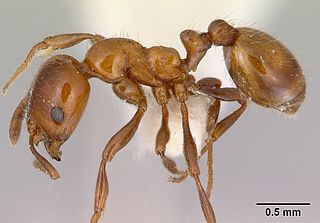
Monomorium antarcticum is an ant of the family Formicidae, endemic to New Zealand. Also known as the southern ant, this is likely New Zealand's most common native ant species. Because it is highly variable in size (3–5mm), colour, and colony structure, it is possible that it consists of a complex of closely related species. It has a generalist diet, including small arthropods, nectar, and seeds, and it also tends aphids, scale insects, and mealybugs to obtain honeydew.
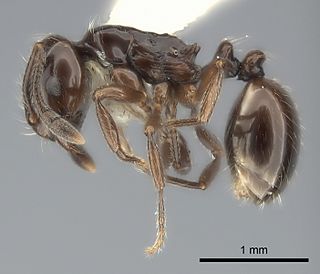
Monomorium bidentatum is a species of ant in the subfamily Myrmicinae. It is endemic to two South American countries, Chile and Argentina.

Monomorium is a genus of ants in the subfamily Myrmicinae. As of 2013 it contains about 396 species. It is distributed around the world, with many species native to the Old World tropics. It is considered to be "one of the more important groups of ants," considering its widespread distribution, its diversity, and its variety of morphological and biological characteristics. It also includes several familiar pest species, such as the pharaoh ant and the flower ant.
Monomorium inquilinum is a species of ant in the genus Monomorium. It is native to Mexico.

Monomorium noualhieri is a species of ant endemic to Algeria.
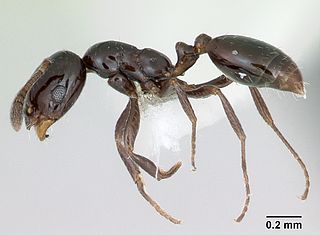
The little black ant is a species of ant native to North America. It is a shiny black color, the workers about 1 to 2 mm long and the queens 4 to 5 mm long. It is a monomorphic species, with only one caste of worker, and polygyne, meaning a nest may have more than one queen. A colony is usually moderately sized with only a few thousand workers.

Trichomyrmex destructor is a species of ant in the subfamily Myrmicinae. Its common names include destructive trailing ant or Singapore ant. It is a pest species in urban areas, known for causing costly damage to structures, vehicles, and electronic devices with its chewing activity. In 2015, the species was moved from the genus Monomorium to the revised genus Trichomyrmex.
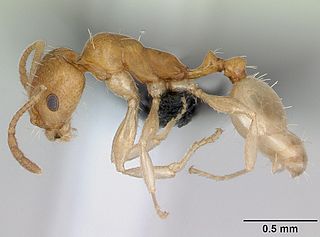
Royidris is a Malagasy genus of ants in the subfamily Myrmicinae. Described in 2014, the genus contains 15 species endemic to Madagascar.
Crematogaster consternens is a species of ant of the subfamily Myrmicinae, which can be found from Sri Lanka.

The bicolored trailing ant or flower ant is a species of ant of the subfamily Myrmicinae. It is a widespread, invasive ant which is found all over the world.
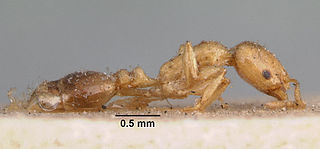
Monomorium latinode, is a species of ant of the subfamily Myrmicinae. It is found in many Asian countries.

Monomorium subopacum, is a species of ant of the subfamily Myrmicinae. It is found in many Asian countries.
Monomorium taprobanae is a species of ant of the subfamily Myrmicinae. It is found in Sri Lanka.
Trichomyrmex emeryi is a species of ant in the subfamily Myrmicinae.










